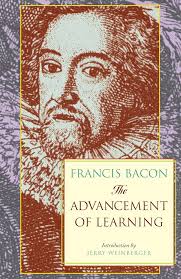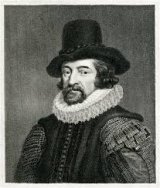The Advancement of Learning Page #18
The Advancement of Learning, published by Francis Bacon in 1605, is a foundational text in the history of science and philosophy. In this work, Bacon advocates for empirical research and the systematic organization of knowledge, laying the groundwork for the scientific method. The book critiques existing scholarly practices and proposes a new approach to learning based on observation and experimentation. It marks a significant shift towards modern scientific inquiry.
- Year:
- 1605
- 1,170 Views
Submitted by acronimous on August 11, 2024
Modified by acronimous on August 11, 2024
a voluntary, for the love and conversation of Proxenus, his friend. He was present when Falinus came in message from the great king to the Grecians, after that Cyrus was slain in the field, and they, a handful of men, left to themselves in the midst of the king’s territories, cut off from their country by many navigable rivers and many hundred miles. The message imported that they should deliver up their arms and submit themselves to the king’s mercy. To which message, before answer was made, divers of the army conferred familiarly with Falinus; and amongst the rest Xenophon happened to say, “Why, Falinus, we have now but these two things left, our arms and our virtue; and if we yield up our arms, how shall we make use of our virtue?” Whereto Falinus, smiling on him, said, “If I be not deceived, young gentleman, you are an Athenian, and I believe you study philosophy, and it is pretty that you say; but you are much abused if you think your virtue can withstand the king’s power.” Here was the scorn; the wonder followed: which was that this young scholar or philosopher, after all the captains were murdered in parley by treason, conducted those ten thousand foot, through the heart of all the king’s high countries, from Babylon to Græcia in safety, in despite of all the king’s forces, to the astonishment of the world, and the encouragement of the Grecians in times succeeding to make invasion upon the kings of Persia, as was after purposed by Jason the Thessalian, attempted by Agesilaus the Spartan, and achieved by Alexander the Macedonian, all upon the ground of the act of that young scholar. VIII. (1) To proceed now from imperial and military virtue to moral and private virtue; first, it is an assured truth, which is contained in the verses:— “Scilicet ingenuas didicisse fideliter artes Emollit mores nec sinit esse feros.” It taketh away the wildness and barbarism and fierceness of men’s minds; but indeed the accent had need be upon fideliter; for a little superficial learning doth rather work a contrary effect. It taketh away all levity, temerity, and insolency, by copious suggestion of all doubts and difficulties, and acquainting the mind to balance reasons on both sides, and to turn back the first offers and conceits of the mind, and to accept of nothing but examined and tried. It taketh away vain admiration of anything, which is the root of all weakness. For all things are admired, either because they are new, or because they are great. For novelty, no man that wadeth in learning or contemplation thoroughly but will find that printed in his heart, Nil novi super terram. Neither can any man marvel at the play of puppets, that goeth behind the curtain, and adviseth well of the motion. And for magnitude, as Alexander the Great, after that he was used to great armies, and the great conquests of the spacious provinces in Asia, when he received letters out of Greece, of some fights and services there, which were commonly for a passage or a fort, or some walled town at the most, he said:—“It seemed to him that he was advertised of the battles of the frogs and the mice, that the old tales went of.” So certainly, if a man meditate much upon the universal frame of nature, the earth with men upon it (the divineness of souls except) will not seem much other than an ant-hill, whereas some ants carry corn, and some carry their young, and some go empty, and all to and fro a little heap of dust. It taketh away or mitigateth fear of death or adverse fortune, which is one of the greatest impediments of virtue and imperfections of manners. For if a man’s mind be deeply seasoned with the consideration of the mortality and corruptible nature of things, he will easily concur with Epictetus, who went forth one day and saw a woman weeping for her pitcher of earth that was broken, and went forth the next day and saw a woman weeping for her son that was dead, and thereupon said, “Heri vidi fragilem frangi, hodie vidi mortalem mori.” And, therefore, Virgil did excellently and profoundly couple the knowledge of causes and the conquest of all fears together, as concomitantia. “Felix, qui potuit rerum cognoscere causas, Quique metus omnes, et inexorabile fatum Subjecit pedibus, strepitumque Acherontis avari.” (2) It were too long to go over the particular remedies which learning doth minister to all the diseases of the mind: sometimes purging the ill humours, sometimes opening the obstructions, sometimes helping digestion, sometimes increasing appetite, sometimes healing the wounds and exulcerations thereof, and the like; and, therefore, I will conclude with that which hath rationem totius—which is, that it disposeth the constitution of the mind not to be fixed or settled in the defects thereof, but still to be capable and susceptible of growth and reformation. For the unlearned man knows not what it is to descend into himself, or to call himself to account, nor the pleasure of that suavissima vita, indies sentire se fieri meliorem. The good parts he hath he will learn to show to the full, and use them dexterously, but not much to increase them. The faults he hath he will learn how to hide and colour them, but not much to amend them; like an ill mower, that mows on still, and never whets his scythe. Whereas with the learned man it fares otherwise, that he doth ever intermix the correction and amendment of his mind with the use and employment thereof. Nay, further, in general and in sum, certain it is that Veritas and Bonitas differ but as the seal and the print; for truth prints goodness, and they be the clouds of error which descend in the storms of passions and perturbations. (3) From moral virtue let us pass on to matter of power and commandment, and consider whether in right reason there be any comparable with that wherewith knowledge investeth and crowneth man’s nature. We see the dignity of the commandment is according to the dignity of the commanded; to have commandment over beasts as herdmen have, is a thing contemptible; to have commandment over children as schoolmasters have, is a matter of small honour; to have commandment over galley-slaves is a disparagement rather than an honour. Neither is the commandment of tyrants much better, over people which have put off the generosity of their minds; and, therefore, it was ever holden that honours in free monarchies and commonwealths had a sweetness more than in tyrannies, because the commandment extendeth more over the wills of men, and not only over their deeds and services. And therefore, when Virgil putteth himself forth to attribute to Augustus Cæsar the best of human honours, he doth it in these words:— “Victorque volentes Per populos dat jura, viamque affectat Olympo.” But yet the commandment of knowledge is yet higher than the commandment
Translation
Translate and read this book in other languages:
Select another language:
- - Select -
- 简体中文 (Chinese - Simplified)
- 繁體中文 (Chinese - Traditional)
- Español (Spanish)
- Esperanto (Esperanto)
- 日本語 (Japanese)
- Português (Portuguese)
- Deutsch (German)
- العربية (Arabic)
- Français (French)
- Русский (Russian)
- ಕನ್ನಡ (Kannada)
- 한국어 (Korean)
- עברית (Hebrew)
- Gaeilge (Irish)
- Українська (Ukrainian)
- اردو (Urdu)
- Magyar (Hungarian)
- मानक हिन्दी (Hindi)
- Indonesia (Indonesian)
- Italiano (Italian)
- தமிழ் (Tamil)
- Türkçe (Turkish)
- తెలుగు (Telugu)
- ภาษาไทย (Thai)
- Tiếng Việt (Vietnamese)
- Čeština (Czech)
- Polski (Polish)
- Bahasa Indonesia (Indonesian)
- Românește (Romanian)
- Nederlands (Dutch)
- Ελληνικά (Greek)
- Latinum (Latin)
- Svenska (Swedish)
- Dansk (Danish)
- Suomi (Finnish)
- فارسی (Persian)
- ייִדיש (Yiddish)
- հայերեն (Armenian)
- Norsk (Norwegian)
- English (English)
Citation
Use the citation below to add this book to your bibliography:
Style:MLAChicagoAPA
"The Advancement of Learning Books." Literature.com. STANDS4 LLC, 2025. Web. 10 Mar. 2025. <https://www.literature.com/book/the_advancement_of_learning_3165>.








Discuss this The Advancement of Learning book with the community:
Report Comment
We're doing our best to make sure our content is useful, accurate and safe.
If by any chance you spot an inappropriate comment while navigating through our website please use this form to let us know, and we'll take care of it shortly.
Attachment
You need to be logged in to favorite.
Log In